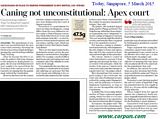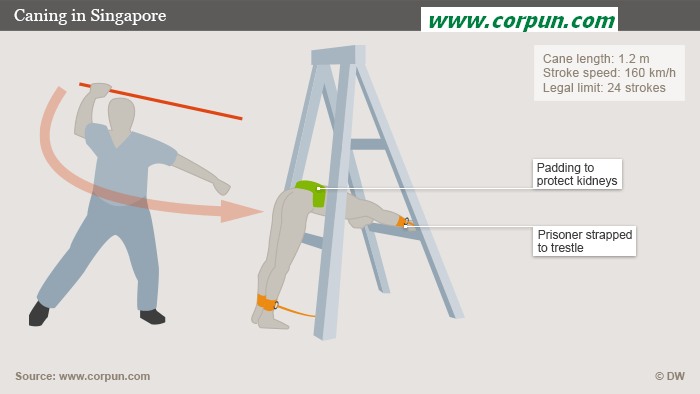|
Corpun file 25984 at www.corpun.com
Today, Singapore, 5 March 2015, p.26Safeguards in place to ensure punishment is not brutal, say judgesCaning not unconstitutional: Apex courtConvicted drug trafficker Yong Vui Kong loses appeal after arguing punishment tantamount to tortureBy Yvonne Lim
SINGAPORE -- The punishment of caning is not unconstitutional, the apex court ruled yesterday, throwing out the latest in a string of legal challenges mounted by convicted drug trafficker Yong Vui Kong. After he became the first to escape the gallows following changes to the mandatory death penalty regime, the 26-year-old Malaysian last year sought to be spared from the 15 strokes of the cane he was re-sentenced to, by arguing that the punishment violated the Constitution. However, his bases for the contention that caning is tantamount to torture were dismissed by the Court of Appeal yesterday. Prescribed as a punishment for selected crimes in Singapore, caning differs from the cases defined as torture under a United Nations convention, which either involved "severe and indiscriminate brutality", or extra-legal acts of abuse in interrogations and war crimes, said the court, which was presided over by Chief Justice Sundaresh Menon. There are also legal requirements, enshrined in statute, on how the punishment is carried out here, the judges added. For example, a medical officer must be present and caning starts and continues only if the offender is certified to be fit enough. "It is undeniably the case that caning inflicts a considerable level of pain and suffering on a prisoner. But this level of pain and suffering is far exceeded by that endured by the victims in those cases where courts held that the conduct in question amounted to torture," they said. The judges, who included Appeal Judge Andrew Phang and Justice Tay Yong Kwang, added that these statutory requirements act as "safeguards" to ensure caning in Singapore's prisons "does not breach the high threshold of severity and brutality that is required for it to be regarded as torture". For instance, caning is administered on the buttocks, which minimises the risk of injury to bones and organs, they said. It is also carried out in private and out of sight of other prisoners. The rattan, which is soaked in water beforehand to prevent it from splitting and shearing the skin, is also treated with antiseptic, while the strokes of the cane are "meted out in a measured and controlled manner at regular intervals", the judges added. How international law norms regard caning is also irrelevant, the court said, since Parliament has prescribed for caning under Singapore's laws, and the judiciary is bound to implement legislation, as long as they are not incompatible with the Constitution. A similar line of reasoning defeats another of Yong's argument against caning, which was that it is too irrational and arbitrary to be regarded as law, since its deterrent effect is unclear.
In response, the judges said: "The simple answer is that sentencing policy is a matter for the legislature and it is not for the courts to judge whether a particular type of sentence prescribed by Parliament is justified as a matter of deterrence." Yong's argument that caning discriminates against men under 50 -- the punishment is not carried out on an offender above that age -- is also without merit, the judges said. This differentia clearly serves the objective of ensuring that only those who are physically fit to be caned suffer the punishment, they said. In addition, the criteria for exclusions are policy decisions that Parliament is entitled to make and "there is no justification for us to interfere", the judges added. Yesterday's court decision marked the end of a series of legal bids Yong has launched since he was caught in 2007 as a 19-year-old for trafficking 47.27g of heroin. These ranged from his appeal against the compulsory death sentence originally handed down to him to his challenge on the lack of discretion for the President to grant clemency. Suspended from legal practice pending a psychiatrist's assessment, Yong's lawyer M Ravi was in court yesterday to observe proceedings. Corpun file 25985 at www.corpun.com
The Straits Times, Singapore, 6 March 2015German vandals get 9 months, 3 strokesDuo express remorse, but DPP stresses seriousness of depot breachBy Elena Chong
THE two German men who in November sneaked into the SMRT Bishan depot through a drain and vandalised a train, have been sentenced to nine months in jail and three strokes of the cane. Andreas Von Knorre, 22, and 21-year-old Elton Hinz both pleaded guilty and yesterday told the court, in English, of their remorse, swearing never to repeat their "stupid" mistake. But Deputy Public Prosecutor Timotheus Koh stressed the seriousness of their offences, which took "thorough, meticulous, deliberate and elaborate" planning. "They have defaced a train involved in the provision of public services," he said. "They have breached the security of a protected place, thereby giving rise to concerns about the security of our public transport system."
SMRT also told The Straits Times that the graffiti meant that the affected train had to be taken off service for nine days, affecting over 200,000 commuter trips. Mr Koh called for a punishment that would warn would-be train vandals that the courts here would not stand for such a flagrant breach of the law. The incident was the second security breach at the Bishan depot and the fourth case of train vandalism in 4½ years. The two men received the minimum three strokes of the cane for the vandalism, but a German embassy spokesman, while urging citizens to adhere to the law when visiting here, said that its government "is opposed to corporal punishment anywhere in the world, including in Singapore".
The sentencing was reported by several European news sites, including the BBC and German broadcaster Deutsche Welle. The deputy director of the Asia division of Human Rights Watch, Mr Phil Robertson, criticised the sentence, telling Reuters that caning is "a blatant disregard for international human rights standards". On Wednesday, the Court of Appeal ruled in a separate case involving a drug trafficker that caning of prisoners is not torture and is constitutional. Swiss expatriate Oliver Fricker was the last person found guilty of vandalising a train after he broke into SMRT's Changi installation in May 2010 with an accomplice, who remains at large. He was jailed for seven months and given three strokes of the cane. Von Knorre and Hinz, who arrived here from Australia on Nov 4, admitted to entering the Bishan depot on Nov 7 and 8 and spraying graffiti on a train cabin on Nov 8. The charge of entering the place on Nov 6 was considered. Mr Koh highlighted how the duo spent almost 45 minutes on their "handiwork", and even took photographs in front of the vandalised train. Judge Liew Thiam Leng, who backdated their sentences to Nov 22, noted that the offences were quite well planned, premeditated and difficult to detect. SMRT had to spend $6,500 on cleaning the train and another $7,150 to supervise the operation. The duo's lawyer, Mr Christopher Bridges, said his clients had learnt their lesson and tried to pay the cleaning charges of $6,500, although SMRT rejected the offer. "This is the darkest episode of my entire life," Von Knorre told the court. "I want to apologise to the state of Singapore for my stupid mistake." Hinz said: "Definitely I promise you I will never do it again. I want to not only apologise to you, but also to my family because of the shame and situation I have put them into." They came, they saw, they vandalisedBy Danson Cheong THRICE they entered the SMRT Bishan depot during the wee hours, defying security and conducting reconnaissance before finally deciding where they would leave their mark. German nationals Andreas Von Knorre, 22, and Elton Hinz, 21, had sneaked into the depot via the drainage system, eluding intrusion detection systems on reinforced steel fences around the facility. They entered the protected area first on Nov 6 last year, and again the next two days. The second time, the duo scaled a wall after emerging from the drain. There, they observed the parked trains on the same level. The next day, they entered the depot in the same fashion. They posed for a photograph before defacing the left side of a train carriage with graffiti measuring 10m by 1.8m. They disposed of the 12 spray cans -- which they had bought from the Art Friend store in Clementi -- under some wooden crates near the tracks. The duo left Singapore for an unspecified destination that same day. They were later arrested in Malaysia on Nov 21, and extradited to Singapore. In a statement, SMRT said both men "went to great lengths and made an extraordinary effort" to exploit security vulnerabilities. The Land Transport Authority told The Straits Times that SMRT "has taken actions to improve security measures for potential entry points, and further enhanced its security patrols for the Bishan depot". It added that it is currently assessing if SMRT has breached its licence conditions.
|
|
|
The Attorney-General's Chambers (AGC) has responded to criticism over the caning sentence meted out to the two German men who vandalised a train after sneaking into the SMRT Bishan depot.
Stressing that Singapore's laws against vandalism are well known, an AGC spokesman said the same standards are applied to everyone.
The spokesman also highlighted the seriousness of the crimes, adding: "They came to a foreign country, repeatedly trespassed into security sensitive areas and deliberately flouted our laws."
Last Thursday, Andreas Von Knorre, 22, and Elton Hinz, 21, were sentenced to nine months in jail and three strokes of the cane after pleading guilty.
[...]
International organisation Human Rights Watch (HRW) described caning as a form of torture, adding that Singapore's decision to use it as a punishment is "indicative of a blatant disregard for international human rights standards".
But the AGC, in its response to the embassy spokesman and HRW, rejected this. "Caning is not torture," its spokesman said. "It is carried out in Singapore under strict standards, monitored at all times by a doctor.
"The accused persons in this case were vandals who broke the law for their own self-aggrandisement, without consideration of the social costs and the disruptions that their acts would cause to others...
"In taking action against them, we are holding them to the same standards as all others, a fundamental principle of justice which we have always abided by."
Most netizens who posted comments on news sites, such as those in Britain and Australia, praised Singapore for its strong stance against vandalism, with several urging their own governments to do the same.
Corpun file 26027 at www.corpun.com
![]()
The Straits Times, Singapore, 21 March 2015, p.A2
Sex predator gets 30 years' jail, maximum 24 strokes
Man sexually abused 31 boys, some as young as 11, whom he met online
By Selina Lum

YAP Weng Wah stood in court with his hands clasped in front of him, closed his eyes and let out a sob from time to time as he waited for his sentence.
When it came, he stared blankly. The 31-year-old Malaysian engineer was given 30 years' jail and the maximum 24 strokes of the cane for sexually abusing 31 boys between 2009 and 2012.
The boyish-looking Yap hardly looked like the villain in Singapore's worst case of sexual abuse of young boys.
But this was a man who, after befriending them online, cajoled victims as young as 11 -- the oldest was 15 -- into performing oral sex or letting him sodomise them. In the case of one boy, there was no sex but he was persuaded to send Yap a video of him performing a lewd act.
Justice Woo Bih Li made it clear that the high-risk offender needed to be put away for a long time to protect society and as a warning that such heinous acts would not be tolerated.
"There is... a strong public interest in the present case to deter potential sexual offenders from using the Internet to lure young victims," he said.
In the gallery were Yap's family -- his mother and younger brother and sister -- who had come from Ipoh.
The judge pointed out how Yap tried to hide the extent of his crimes.
When he was questioned after a victim lodged a report, he told the police that he had sex with just three boys. The truth was far more shocking.
In a raid on his home on Sept 12, 2012, around 2,000 video clips of him having sex were found in his laptop -- footage that he would watch to pleasure himself.
It was through these videos, which were meticulously catalogued based on the boys' names, ages and the year he met them, that the victims were traced. Some of the boys could not be identified. There were, however, at least 14 other boys he had taped during his visits to Malaysia.
The 76 charges against Yap took up 23 pages. He committed the acts at his flat, in hotel rooms, at a public park, and in toilets at shopping centres and swimming pools.
In the case of one 13-year-old, he arranged a meeting at Hougang Swimming Complex some time in early 2010. In a toilet cubicle, he told the boy to remove his school uniform. He then sodomised the boy and recorded the act with his phone.
Around March 2010, he took a 15-year-old to a hotel. Yap undressed and tried to kiss the boy. Even when the boy protested, Yap performed oral sex on him.
He hunted for his victims on Facebook, often pretending to be a polytechnic student. He gained the boys' trust by portraying himself as an elder brother. And he invited them to share their problems with him.
|
|
Yap also made it a point to find out their interests and hobbies, then used the knowledge to arrange meetings with the victims under various pretexts, such as to give them gifts, play computer games or give body-building tips.
Justice Woo said Yap's premeditated use of the Internet to hunt for a large number of victims, and breaching the boys' trust after earning it, were aggravating factors. "Yap was planning and hunting for victims to satisfy his deviant urges," he said.
It was made worse by Yap recording videos of the sex acts despite the boys' protests. He assured his victims that he would delete the videos, but instead saved them on his laptop.
The videos were at risk of being circulated if they fell into the hands of third parties, said Justice Woo.
Yap, who in January admitted to 12 charges of sexual penetration of a minor, with the rest of the charges taken into consideration during sentencing, pleaded for compassion.
In a letter he read out in court, he said he was a first-time offender. He claimed to have found religion and vowed to do one good deed a day.
Yap also swore never to repeat his acts, was sorry for his "disgraceful" crimes and that he was ashamed of his sexuality.
He claimed to have developed a "phobia" of young boys in the more than two years that he had spent in remand. But the judge was not convinced.
Yap's multiple offences over a long period meant that his claim to be a first-time offender carried little weight. The judge also said Yap's guilty plea "did not spring from genuine remorse, but from a realisation that his goose was as good as cooked".
High risk of offending: Psychiatrist
WHEN he was arrested in 2012, Yap Weng Wah was working as a quality assurance engineer at ASM Technology in Yishun.
When The Straits Times visited the company, few seemed to have heard of him.
But one 29-year-old technician, who gave his name as Mr Li, recognised him. He said people at work knew Yap as "Travis".
He said Yap "seemed very normal at work".
"He was always very quiet, he never showed any signs that he had these perversions," said Mr Li. "I only found out when I read the newspapers, I was shocked, I didn't expect he would be like that."
According to the defence, Yap, who moved to Singapore in 2009, had a nine-month sexual relationship with his male maths teacher when he was 12.
Yap thought what happened in the relationship were acts of intimacy and love, said his lawyer Daniel Koh.
It was also claimed that Yap had a phobia of approaching women, after he was rejected and humiliated by a female classmate.
The Institute of Mental Health's Dr Bharat Saluja found that Yap had hebephilia -- a sexual interest in pubescent youth, typically between the ages of 11 and 14.
The psychiatrist also noted that Yap's risk of re-offending was high.
Corpun file 26034 at www.corpun.com
![]()
The Straits Times, Singapore, 26 March 2015, p.B2
Man gets three years' jail, six strokes for rioting
By Elena Chong
Court Correspondent

A 21-YEAR-OLD man was part of a group that punched and kicked two men outside a club last October, leaving one with a serious head injury.
For rioting, Ahmad Ridhwan Wee Ahmad Jafni was sentenced to three years' jail and six strokes of the cane yesterday.
District Judge Shaiffudin Saruwan said the group had behaved like "a pack of hyenas", and that he was more concerned about Ridhwan, who has a prior stint in the Reformative Training Centre (RTC).
Ridhwan and four others were part of an unlawful assembly when some of them attacked Mr Shawn Ho Yong Han, 25, and Mr Wang Jie Feng, 21, along Serangoon Road on Oct 22 last year.
The victims and Ridhwan's group had been drinking at Club Flux in Serangoon Road on the night of Oct 21.
At about 3.20am, when Mr Ho and Mr Wang were about to leave, a performing artist went over to their table to talk to Mr Ho. Mr Wang then saw a patron who was allegedly sitting with Ridhwan's group pointing his finger aggressively at Mr Ho.
Sensing trouble, the pair decided to leave and started walking along Serangoon Road, hoping to catch a taxi.
Ridhwan and his accomplices followed them. After they caught up with the victims, they punched and kicked them for about two minutes.
Mr Ho was taken to Tan Tock Seng Hospital with cuts and head injuries. He was discharged two days later against medical advice.
A subsequent brain scan at Mount Elizabeth Novena Hospital showed post-traumatic aphasia and bleeding in his brain. Mr Ho was initially unable to speak, but has partially recovered.
 |
He also suffered from post-traumatic epilepsy as a result of the head injury and will need to take anti-convulsant medication for the rest of his life. Mr Wang suffered minor injuries and did not see a doctor.
During sentencing, Judge Shaiffudin also expressed his concern over the escalating violence shown by young people.
Police statistics showed that 322 youth were arrested for rioting last year, up from 283 in 2013 and 239 in 2012.
The judge had some parting words for Ridhwan as well. "You have a lot of time to reflect in prison. I hope what you have said -- you promise you will change -- is genuine," he said.
Ridhwan has a previous conviction for loan shark harassment in 2011, and was released from RTC in October 2013.
One of the four co-accused, Adam Koh Yong Sheng, 20, has been sentenced to reformative training. The case against the rest is pending.
Ridhwan, whose sentence was backdated to Oct 30 last year, could have been jailed for up to seven years and caned.
About this website
Search this site
Country files: Corporal punishment in Singapore
Article: Judicial caning in Singapore
Archive 2015: Singapore
Video clips
Picture index
Previous month







